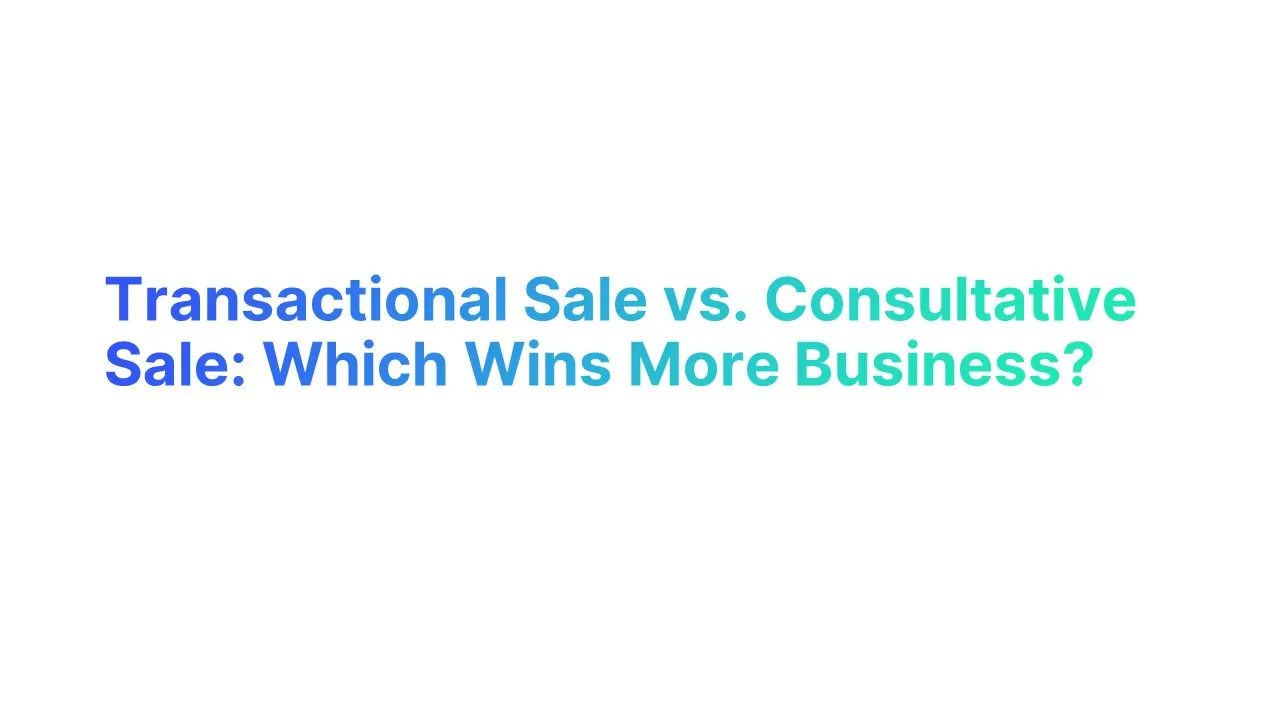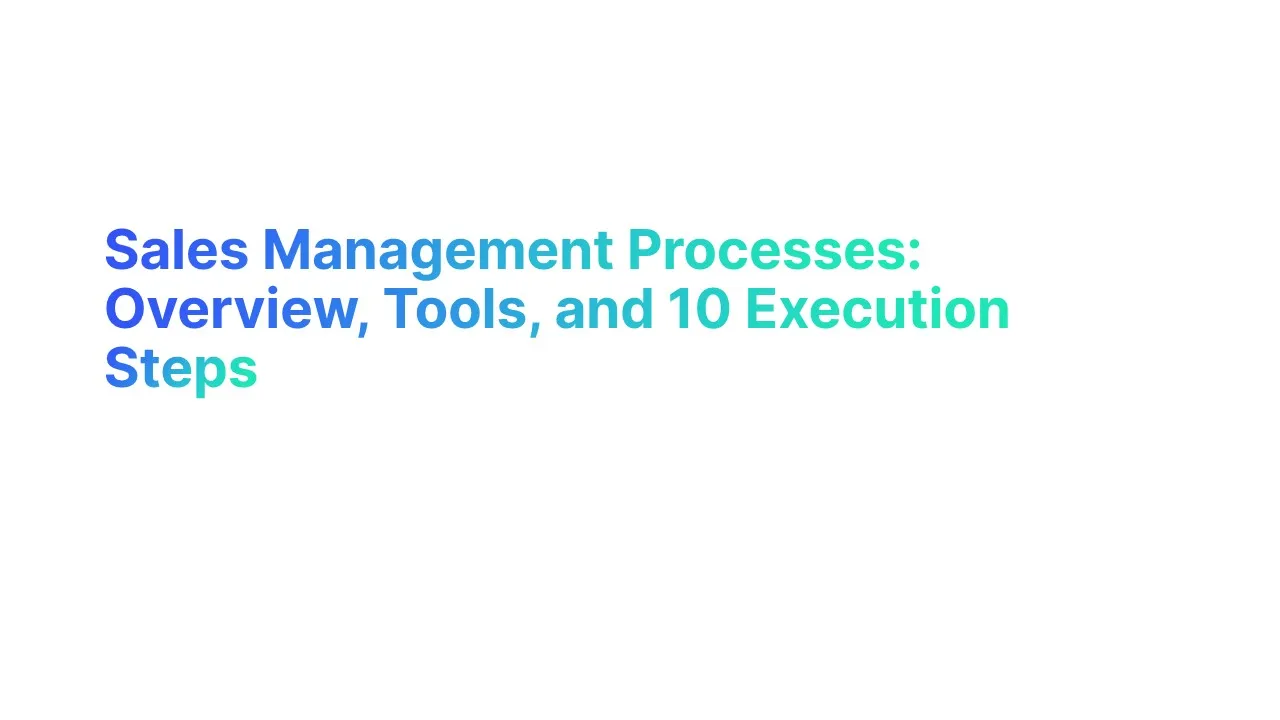What is Transactional Selling

Transactional selling is a sales approach focused primarily on short-term sales transactions rather than long-term customer relationships. It emphasizes immediate results, often with little emphasis on customer needs beyond the initial sale.
This method is particularly prevalent in environments where quick, volume-based sales are prioritized, such as retail or commodity products.
Characteristics of Transactional Selling:
- Quick Closure: The goal is to close sales quickly, often within a single interaction.
- Price Focus: Emphasizes competitive pricing to attract customers seeking the best deal.
- High Volume: Suitable for businesses where sales volume is critical to profitability.
- Limited Customer Interaction: Minimal engagement with customers beyond the sale, which may lead to reduced customer loyalty.
Prevalence: According to market studies, transactional selling strategies account for a significant portion of retail and B2C sales environments, where product differentiation is low and customer decision time is short.
How Does Transactional Sales Work
The process of transactional sales involves several key steps designed to maximize efficiency and drive sales volumes. The effectiveness of this approach can often be seen in businesses like electronics stores or online platforms where price and availability drive consumer choice.
Key Steps in Transactional Sales:
- Initial Contact: Often brief, with a focus on introducing the product and its price advantage.
- Presentation: Quick demonstration or presentation of the product’s features and benefits, emphasizing value for money.
- Handling Objections: Swiftly addressing any customer concerns to prevent delays in the purchasing decision.
- Closing the Sale: Employing techniques to encourage immediate decision-making, such as limited-time offers or discounts.
Sales strategies:
- Upselling and Cross-Selling: Effective in increasing the transaction value; for example, suggesting accessories or related products at the point of sale.
- Limited-Time Offers: Statistics show that offers limited to a specific timeframe can increase sales by up to 30%, as they create a sense of urgency.
- Simplified Buying Process: Streamlining the purchasing process to minimize barriers to sale, such as offering express checkout options.
What is Consultative Selling

Consultative selling is a sales approach that prioritizes the needs and challenges of the customer above simply making a quick sale. Unlike transactional selling, which focuses on short, direct sales interactions, consultative selling involves building long-term relationships with customers through personalized interactions and a deep understanding of their unique needs.
Key Features of Consultative Selling:
- Customer-Centric: This approach is all about understanding the customer's business, pain points, and requirements.
- Solution-Oriented: Sales reps focus on offering solutions that specifically address the issues faced by the customer.
- Relationship Building: Emphasizes developing long-lasting customer relationships rather than one-off sales.
- Educational Approach: Sales professionals act as consultants, educating customers on how their needs can be met through the products or services offered.
Statistics: Research indicates that sales strategies focused on customer relationships can lead to a 25% increase in customer retention and loyalty compared to more transactional methods.
How Does Consultative Sales Work
Consultative sales follow a structured process that fosters trust and credibility, aiming to create value for both the customer and the seller. This method is especially effective in industries where the buying process is complex, and the stakes are high, such as enterprise software or specialized B2B services.
Process of Consultative Sales:
- Needs Assessment: Through active listening and skilled questioning, sales reps identify the specific needs and challenges of the customer.
- Tailored Solutions: Based on the assessment, a customized solution is proposed that directly addresses the identified needs.
- Feedback and Adaptation: There is an ongoing dialogue where feedback is encouraged, and solutions are adapted to better fit customer needs as they evolve.
Consultative Techniques:
- Developing Insightful Questions: Sales professionals use a consultative sales approach to delve deeper into customer needs and expectations.
- Building Credibility: Providing examples of consultative selling in action, such as case studies or testimonials, can enhance trust and reassure potential customers of the effectiveness of the approach.
- Long-Term Engagement: Strategies like regular follow-ups and updates on new features or services help maintain the relationship, emphasizing long-term engagement over immediate sales success.
Transactional Selling Examples

Transactional selling, which emphasizes quick sales and high volume without a significant focus on customer relationship building, is prevalent in many industries. Here are some concrete examples that illustrate how transactional selling operates in different business contexts:
Retail Sector
Electronics Stores: During events like Black Friday, the sales team at big-box retailers utilizes transactional selling techniques to encourage short sales cycles. Customers are enticed with competitive pricing and limited-time offers.
Example: A sales representative quickly highlights the limited availability of a high-discount laptop during a clearance sale to close the deal rapidly, reflecting a transactional sales focus.
E-commerce
Flash Sales: Online platforms leverage short sales cycles through flash sales, where products like headphones are offered at a steep discount for a limited time.
Example: Amazon prompts quick decisions from customers by using countdown timers and emphasizing the savings, an approach far removed from consultative selling.
Automotive Industry
End-of-Model-Year Sales: Car dealerships emphasize a transactional sales focus to clear inventory through significant price reductions, aiming to minimize the lengthier sales cycle typical of consultative approaches.
Example: A sales rep actively promotes the immediate benefits of purchasing last year's car model at reduced prices, geared towards achieving quick turnover rather than cultivating repeat customers.
Service Industry
Telecom Packages: Here, the sales process involves offering promotional pricing on bundled services to facilitate quick purchases, typically without aiming for repeat business.
Example: Sales representatives focus on the immediacy of the savings a customer will gain by signing up for a limited-time discounted telecom package.
Travel and Hospitality
Last-Minute Travel Deals: Travel agencies use transactional selling tactics to fill seats and rooms quickly, often sacrificing the potential for repeat business in exchange for immediate sales.
Example: A travel website employs urgent messaging to sell a vacation package at a reduced rate, promoting rapid decision-making over careful consideration.
Fast-moving Consumer Goods (FMCG)
Supermarket Checkouts: Impulse-buy items are strategically placed to encourage quick add-on purchases as part of the supermarket’s sales process.
Example: Shoppers are tempted by low-cost items like snacks or magazines, placed to catch the eye and encourage a quick purchase, a classic example of a transactional sales focus without the aim of building long-term relationships.
Consultative Selling Examples

Consultative selling, which focuses on customer needs, long-term relationships, and tailored solutions, can be seen across various industries. This sales approach involves a deeper engagement with the client, understanding their challenges, and providing customized solutions that go beyond mere transactions.
Here are several examples demonstrating how consultative selling is applied in different business settings:
Software Solutions
Enterprise Software Sales: In this sector, sales professionals often engage in detailed discussions with potential clients to understand their business processes and pain points.
Example: A sales rep from a CRM software company might spend several meetings understanding a client's customer relationship challenges and then propose a customized configuration of their software that integrates seamlessly with existing tools the client uses.
Healthcare
Medical Equipment Sales: Selling complex medical devices requires a thorough understanding of the client’s needs, often involving demonstrations and long-term support.
Example: A medical device salesperson might work closely with hospital procurement teams and medical staff to understand their specific requirements and demonstrate how their equipment can improve patient outcomes and streamline workflow.
Financial Services
Wealth Management Services: Financial advisors use consultative selling to tailor their advice to the financial goals and risk tolerance of each client.
Example: An advisor might conduct an extensive initial assessment of a client's financial status, goals, and fears before recommending a bespoke portfolio of investments.
Real Estate
Commercial Real Estate: This field requires understanding the client's business needs deeply, such as traffic patterns for retail spaces or office layouts for tech firms.
Example: A real estate agent might spend time learning about a tech company’s culture and growth plans to suggest properties that not only fit their current size but also offer options for expansion.
Automotive Industry
Fleet Sales for Corporations: Sales professionals might consult with businesses to understand their operational needs, driving conditions, and budget before recommending vehicles.
Example: A salesperson could analyze a company's vehicle usage patterns and suggest a mix of electric and gas vehicles that optimize efficiency and cost, including a cost-benefit analysis of switching to electric vehicles.
Advertising and Marketing
Digital Marketing Services: Agencies often provide detailed consultations to create marketing strategies that align with a client’s business objectives and target audience.
Example: A marketing consultant might review a client's previous campaigns, perform audience analysis, and then develop a tailored marketing strategy that incorporates SEO, content marketing, and social media outreach.
Consulting Services
Management Consulting: Consultants in this field deeply integrate with a client's business to understand their strategic challenges and then develop bespoke solutions.
Example: A management consultant might conduct workshops and interviews with a company’s leadership to identify efficiency gaps and propose specific process changes.
Training and Development
Corporate Training Programs: Trainers might create customized programs after assessing a company's workforce skills and needs.
Example: A corporate trainer could design a leadership development program after assessing the skills of mid-level managers and identifying specific gaps that need to be addressed to prepare them for senior roles.
Traditional vs Transactional vs Consultative Selling
What Wins More Business: Transactional or Consultative Sales?

The question of which sales method—transactional or consultative—wins more business depends largely on the nature of your business and market conditions.
Transactional sales tend to drive higher volumes quickly, making it ideal for businesses that deal in commodities or standardized products where customer decisions are largely price-driven. This approach can rapidly increase sales numbers, particularly in markets that are highly competitive on price.
Consultative sales, on the other hand, often result in fewer, but larger and more profitable deals. This method is better suited for businesses that offer complex or high-value products and services where the buying decision involves significant consideration. Consultative selling builds deeper customer relationships, leading to higher customer retention, greater customer lifetime value, and often more business referrals.
Therefore, if your business thrives on quick sales cycles and volume, transactional sales might win more business for you. If your business model relies on long-term customer relationships and high-value contracts, consultative sales will likely be more successful. Each has its strengths and the best choice depends on your specific business goals and the nature of your products or services.
Concluding Thoughts
In the debate between transactional and consultative selling, each method suits different business needs. Transactional selling is ideal for quick, volume-driven sales where customer engagement is minimal, perfect for straightforward, price-sensitive transactions. Consultative selling, however, excels in complex environments requiring deep understanding and long-term customer relationships, offering tailored solutions and building trust. Integrating both approaches allows businesses to adapt to various sales scenarios, maximizing both immediate and long-term success.





.png)



